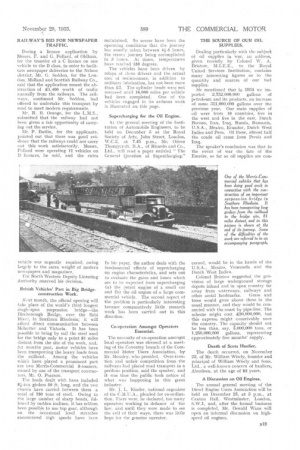RAILWAY'S BID FOR NEWSPAPER TRAFFIC.
Page 33

If you've noticed an error in this article please click here to report it so we can fix it.
During a lieence application by Messrs. F. and G. Pollard, of Oldham, for the transfer of a C licence on one vehicle to the B class, in order to facilitate newspaper deliveries to the Nelson district, Mr. G. Seddon, for the London; Midland and Scottish Railway Co., said that the application meant the ahstraction of £1,400 worth of traffic annually from the railways. The railways, continued Mr. Seddon, had offered to undertake this transport by road to meet modern requirements.
Mr. R. B. Orange, for the L.M.S., subMitted that the railway had not been given a fair opportunity of carrying out the service.
Mr. P. Butlin, for the applicants, pointed out that there was good evidence that the railways could notcarry out this work satisfactorily. Messrs. Pollard were operating 12 vehicles on B licences, he said, and the extra vehicle was urgently reouircd, owing largely to the extra weight' of modern newspapers and magazines.
The North Western Deputy Licensing Authority reserved his decision.
British Vehicles' Part in Big Bridge. construction Work.
Next month, the official opening will take place of the world's third longest single-span suspension bridge—the Birchenough Bridge, over the Sabi River, in Southern Rhodesia; it will afford direct communication between Melsetter and Victoria. It has been possible to bring by rail the steel used for the bridge only to a point 81 miles distant from the site of the work, and, for months past, motor vehicles have been transporting the heavy loads from the railhead. Among the vehicles which have played a prominent part are two Morris-Commercial 3-tonners, owned by one of the transport contractors, Mr, 0. Pearson.
The loads dealt with have included 81--ton girders 50 ft. long, and the two chassis have carried between them a total of 750 tons of steel. Owing to the large number of sharp bends; followed_ by sudden inclines, it has seldom been possible to use top gear, although on the Occasional level stretches encountered high :speeds have been
maintained. So severe have been the operating conditions that the journey has usually taken between. 41-5 hours, the return journey being accomplished in 3 hours. At times, temperatures have reached 150 degrees.
The vehicles have been driven by relays of three drivers and the actual cost of maintenance, in addition to ordinary lubrication, has not been more than £2. The cylinder heads were not removed until 16,000 miles per vehicle bad been completed. One of the vehicles engaged in its arduous work is illustrated on this page.
Supercharging for the Oa Engine.
At the general meeting of the Institution of Automobile Engineers, to be held on December 3 at the Royal Society of Arts, John Street, London, W.C.2, at 7.45 p.m., Mr. Oliver Thornycroft, 13.A., of Ricardo and Co., Ltd., will read a paper entitled " The General Question of Supercharging."
In his paper, the author deals with the fundamental effects of supercharging on engine characteristics, and sets out to evaluate the gains and losses which are to he expected from supercharging (a) the petrol engine of a small car and (b) the oil engine of a large commercial vehicle. The second aspect of the problem is particularly interesting because comparatively little research work has been carried out in this direction.
Co-operation Amongst Operators Essential.
The necessity of co-operation amongst local operators was stressed at a meeting of the Coventry branch of the Commercial Motor Users • Association, by Mr. Mousley, who presided. Over-taxation and unfair competition from the railways had placed road transport in a perilous position, said the speaker, and it was time the public took notice of what was happening in this great industry.
Mr. J. L. Kinder, national organizer of the C.M.II.A., pleaded for co-ordination. There were, he declared, too many operators working in defiance of the law, and until they were made to see the evil of their ways, there was little hope for the genuine operator. THE SOURCE OF OUR OIL SUPPLIES.
Dealing particularly with the subject of oil supplies in war, an address, given recently by Colonel W. A. Bristow, M.LE.E., to the Royal United Services Institution, contains many interesting figures as to the quantity and sources of our fuel supplies.
He mentioned that in 1934 we imported 2,752,000,000 gallons of petroleum and its products, an increase of some 311,000,000 gallons over the previous year. Our main supplies of oil were from 10 countries, five in the west and five in the east, Dutch Borneo, Iran, Iraq, Russia, Rumania, U.S.A., Mexico, Ecuador, Dutch West Indies and Peru. Of these, almost half the crude oil came from Persia and Iraq.
The speaker's conclusion was that in the event of war the fate of the Empire,, so far as oil supplies are con
cerned, would be in the hands of the U.S.A., Mexico, Venezuela and the Dutch West Indies.
Colonel Bristow suggested the provision of large underground storage depots inland and in open country far away from waterways, railways and other aerial landmarks. Grass and trees would grow above these in the usual manner, and they would be connected with the coast by pipe-line. The scheme might cost £20,000,000, but this expense might conceivably save the country. The capacity should not be less than, say, 5,000,000 tons, or 3,250,000,000 gallons, representing , approximately five Months' supply.
Death of Scots Haulier.
The death occurred, on November 22, of Mr. William Wisely, founder and principal of William Wisely and Sons, Ltd., a well-known concern of hauliers, Aberdeen, at the age of 83 years.
A I3iscassion on Oil Engines.
The annual general meeting of the Diesel Engine Users Association will be held on December 18, at 3 p.m., at Caxton Hall, Westminster, London, S.W.1, and, after the formal business is completed, Mr. Oswald Waits will open an informal discussion on highspeed oil engines.




























































































